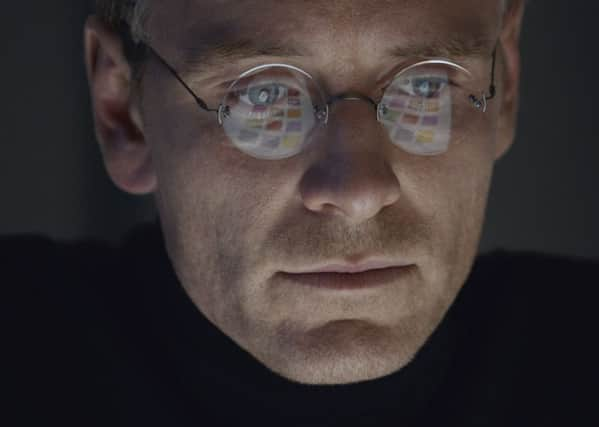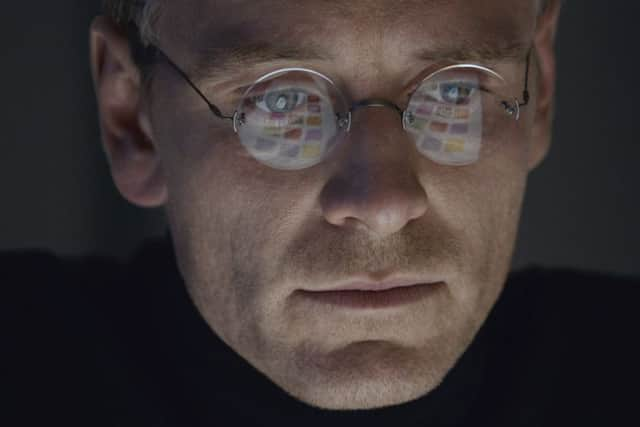Film reviews: Steve Jobs | Fathers and Daughters


Steve Jobs (15) | Rating: **** | Directed by Danny Boyle
Starring Michael Fassbender, Kate Winslet, Seth Rogen, Jeff Daniels, Katherine Waterston
The eponymous title may give the impression that Steve Jobs is yet another comprehensive cradle-to-the-grave biopic, but director Danny Boyle and screenwriter Aaron Sorkin’s combined take on the Apple co-founder is appropriately iconoclastic, breaking free from the dreary strictures of the rise-fall-redemption character arc to crack Jobs open in a way that’s intentionally impossible with his products. The film uses that Apple design feature – or flaw, as the company’s other co-founder, programming genius Steve “Woz” Wozniak (Seth Rogen), puts it – as a driving metaphor for his need to control all aspects of his life, something we come to understand via both Michael Fassbender’s performance as Jobs and the film’s intriguing structure.


Advertisement
Hide AdSet against the backdrop of three significant product-launches, the film begins with the 1984 arrival of the Macintosh. Launched on a wave of hype, the computer is being marketed as a rival to the PC. But it’s the backstage drama rather than the onstage theatrics that Boyle and Sorkin are interested in. Ignoring the presentation altogether, they instead cut to a quick post-script before jumping ahead to Jobs’s post-firing attempt to launch a rival computer system with 1988’s doomed NeXT system before finally alighting on the game-changing, world-conquering iMac, introduced a decade later following his return to Apple.
Resembling a three-act play, the film telescopes a lot of biographical details into these heightened moments of drama, with Sorkin using the launches in much the same way he used the lawsuits filed against Facebook founder Mark Zuckerberg in his script for The Social Network: to present a rounded portrait of a complex individual in a more streamlined way. Jobs’s obsessive attention to detail, the ruthless way he dealt with colleagues, his unwillingness to acknowledge the past because it might somehow distract attention from the future are all teased out via the frantic clashing of ideas, personalities and ideologies as underlings run around fretting about the lighting or whether or not the Macintosh will say “hello” at its unveiling.
The film also repeatedly zeroes in on the strained relationship Jobs had with his daughter, Lisa, whose paternity he at first refused to acknowledge (coming up with an arcane algorithm to counter the DNA test results), but whose constant presence in the film (she’s respectively played age 5, 9 and 19 by Mackenzie Moss, Ripley Sobo and Perla Haney-Jardine) becomes a way of exploring his own peculiar psychological make-up as an abandoned child himself. As the film has it, all his big picture thinking – his desire to craft beautifully designed, perfectly engineered products – was really an attempt to compensate for how poorly made he felt he was.
If that sounds a little too simplistic, it is actually in keeping with Jobs’s determination to simplify everything and make it user-friendly. In this spirit the film is also simply a dazzling piece of entertainment. The performances Boyle gets out of his cast – which includes Kate Winslet as Jobs’s head of PR Joanna Hoffman, Katherine Waterston as Lisa’s mother Chisann Brennan, and Jeff Daniels as Apple CEO John Scully (otherwise known as the man who fired Steve Jobs) – make Sorkin’s verbose script sing, and the theatricality of its structure is offset by Boyle’s visual panache.
Though David Fincher was at one point attached to direct, Boyle proves a smart replacement. His films have always pulsated with a kind of restless energy reflective of characters intent on getting somewhere other than where they are. Steve Jobs is no different: this is a film about someone desperate to build the future he’s seen in his head and Boyle reflects this in the way he shoots the movie, using different film stocks for each segment to track the change from analogue to digital while also embracing Sorkin’s penchant for furiously paced walk-and-talk dialogue scenes (which are also apparently in synch with Jobs’s preferred mode of taking meetings).
As for Fassbender, he doesn’t really look like Jobs until the film enters his late-period tech-guru phase (the turtleneck, the jeans, the trainers, the wireless glasses), but he has an ability to shade Jobs with a menace and magnetism that fits with someone who could inspire cult-like devotion and intense criticism (not for nothing did his Apple colleagues borrow the phrase “reality distortion field” from Star Trek to describe his ability to use his charisma to bend people to his way of thinking).
Advertisement
Hide AdAs such the film doesn’t stint on presenting Jobs as another variant on the dysfunctional genius, but to quote the film, “these things aren’t binary” and Boyle’s innate humanism also ensures it neither vilifies nor venerates its subject. Instead it does the decent thing and treats him like a human being, even when he isn’t always acting like one.
Fathers and Daughters (15) | Rating: * | Directed by: Gabriele Muccino
Advertisement
Hide AdStarring: Russell Crowe, Amanda Seyfried, Diane Kruger, Jane Fonda
Russell Crowe is great movie star and a good actor, but to paraphrase the critical drubbing dispensed to the author he plays in Fathers and Daughters upon publication of a substandard novel, sometimes his choices call into question whether he was ever any good. This ludicrously directed, lousily written, cringingly acted melodrama certainly makes it hard to believe Crowe is the same guy who did LA Confidential, Gladiator and Master and Commander – although fans of his Oscar-winning turn in A Beautiful Mind (if such people exist) might like to know that he rings that bell again here, or at least flirts with the genius-imprisoned-by-mental-illness trope.
In this entirely fictional story, though, clunky expository dialogue is all we have to go on when it comes to assessing the literary prowess of Crowe’s character, Jake Davis, an apparent Pulitzer prizewinner whose editor (played by Jane Fonda) tells him: “You’ve got another Pulitzer in that head,” as she picks him up from a stint in a psychiatric hospital. Jake is suffering from “manic-depressive psychosis”, a condition that requires Crowe to go into bouts of actorly shaking whenever Jake suffers stress associated with the death of his wife in a car accident that he caused. This condition has also called into question his parenting skills, which leads to his sister-in-law (Diane Kruger) announcing that she wants to adopt his daughter, Kate.
So far, so soapy, but the film, directed in bafflingly archaic style by Gabriele Muccino (The Pursuit of Happyness), then jumps forward 20 years to follow the grown-up Kate (now played by Amanda Seyfried) as she works through her daddy issues. She does this partly by engaging in one-night stands, but also by training to be a social worker and trying to connect with a newly mute schoolgirl (Quvenzhané Wallis) whose appalling-sounding circumstances Kate somehow identifies with.
Thenceforth the film cuts back and forth between the two timelines: the past outlining Jake’s struggle to write the titular opus while locked in a custody battle; the present showing the deleterious effect her father’s struggle has had on Kate. It’s all laughingly implausible, with Crowe’s character coming across more like Nicholas Sparks than the sort of wordsmith able to craft prose that could compete with the Donna Tarts and Michael Chabons of the world.
It’s also just ridiculously old-fashioned. Kate’s promiscuity is demonised, yet we’re not supposed to find creepy the fact that her love interest (played by Breaking Bad’s Aaron Paul) is an aspiring writer whose favourite book just happens to be the best-selling one Kate’s father wrote about her. If this were a novel it would have been pulped already.
Tangerine (15) | Rating: *** | Directed by Sean Baker
Starring Kitana Kiki Rodriguez, Mya Taylor
Advertisement
Hide AdIt’s surely no coincidence that in the week Steve Jobs comes out in the UK, so too does the first commercially distributed movie shot on an iPhone. What’s smart about Tangerine, though, is that it makes a virtue of its defiantly lo-fi (but actually pretty good-looking) aesthetic by capitalising on its ubiquity to matter-of-factly present this tale of transsexual prostitutes taking revenge on a cheating boyfriend as regular, slice of life comedy.
It doesn’t make its transgender content an issue, in other words; instead it presents its protagonists as people grappling with life, love, betrayal and the sometimes cruel economics of their chosen profession in ways that are recognisably human, despite existing on the margins of society. Director Sean Baker certainly isn’t trying to artificially elicit our sympathy for his characters; if anything Sin Dee (Kitana Kiki Rodriguez) and Alexandra (Mya Taylor) are so grating as they go about setting the world to rights that they could use a little Hollywood-style softening up. But that would betray the purity of the story, which is funny and touching and non-judgmental; the characters’ take-us-as-we-are attitude all the more endearing because they’re not trying to present a false picture of themselves.
Advertisement
Hide AdThe Lady in the Van (15) | Rating: *** | Directed by Nicholas Hytner
Starring Maggie Smith, Alex Jennings, Roger Allam, Frances de la Tour
Pitched very much at the same audiences who lapped up Philomena, this adaptation of Alan Bennett’s 1999 stage play detailing his strained friendship with the homeless woman he let live in his Camden driveway for 15 years relies heavily on Maggie Smith’s withering turn in the lead role. She’s funny and ferocious as the belligerent Mary Shepherd, caring not a jot for the rising house prices that so preoccupy the desperate-to-be liberal inhabitants who are too polite to ask her to leave. Alex Jennings is fine too as Bennett, playing him both as the meek, Eeyore-voiced chronicler of middle class mores everyone’s familiar with and as a physical projection of his inner voice, the one constantly berating him for passively observing the world instead of actively participating in it. Sadly, everything else in Nicholas Hytner’s film is so scrupulously tasteful that even when the humour turns scatological – the small matter of where Miss Shephard defecates is raised multiple times – everything comes up smelling of roses.
The Hallow (15) | Rating: ** | Directed by Corin Hardy
Starring Joseph Mawle, Bojana Novakovic, Michael McElhatton
Promo director and visual artist Corin Hardy’s next film is set to be a Nick Cave-scripted reboot of Goth horror comic The Crow. Too bad, then, he’s made such an inauspicious debut with The Hallow, a scare-free Irish horror movie about a young couple who find themselves terrorised by baby-snatching demons after moving into a house in the midst of some apparently sacred woods and making the mistake of disrespecting the fairy lore designed to protect the trees from incomers… or something to that effect. It’s mostly cobblers, a mishmash of folk tales, presented at one point in what looks like the Book of the Dead prop from The Evil Dead. Sadly the film has none of the wit or gonzo energy of Sam Raimi’s schlocky classic, though it does have supernatural fungi, which is precisely as menacing as it sounds.